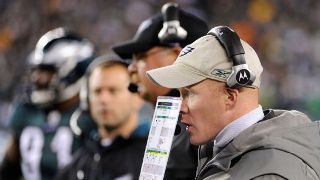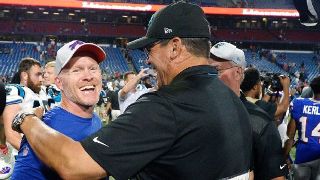|
 ORCHARD PARK, N.Y. -- Twenty years after his first day in the NFL, coach Sean McDermott patrols the practice fields of the Buffalo Bills -- the first franchise to hand him the proverbial keys. ORCHARD PARK, N.Y. -- Twenty years after his first day in the NFL, coach Sean McDermott patrols the practice fields of the Buffalo Bills -- the first franchise to hand him the proverbial keys.
He was the last of a superteam of five assistant defensive coaches with the Philadelphia Eagles in the early 2000s to receive a head-coaching job. Now in his third year, he often thinks of the man who ties them all together -- longtime defensive coordinator Jim Johnson. "All the time," he said. "The older I get, the more you realize, that's why Jim did things the way he did them." Just as Johnson left his mark in Philadelphia, McDermott is trying to put his stamp on this Bills franchise with a grind-it-out work ethic that has a way of trickling down to his players. His journey started on that loaded staff in Philadelphia. McDermott, Bills defensive coordinator Leslie Frazier, Kansas City Chiefs defensive coordinator Steve Spagnuolo, Baltimore Ravens coach John Harbaugh and Carolina Panthers coach Ron Rivera all served together on the same Eagles' defensive staff. They were brought in by then-coach Andy Reid, but Reid left that side of the ball to Johnson -- one of the greatest defensive minds in NFL history. A blitz connoisseur, Johnson produced 10 Pro Bowl defenders from 1999 to 2008, all while mentoring an assembly of coaches who would make the Avengers blush. McDermott, whose Bills (5-1) host the Eagles (3-4) on Sunday (1 p.m. ET, Fox), joined the "Harvard" of defensive staffs in 2002 after working three years as the Eagles' scouting assistant coordinator and assistant to the head coach. He admired Johnson from afar during his first few years in Philadelphia, which made his promotion to defensive assistant and quality control coach one of the more nerve-wracking moments of his young career.
Big break Following the 2001 season, the Eagles' staff gathered in Reid's office because it lacked a formal coaches' meeting room. McDermott sheepishly sank into the chair behind Reid's desk, like a student who was moved two grades above his class. Following the 2001 season, the Eagles' staff gathered in Reid's office because it lacked a formal coaches' meeting room. McDermott sheepishly sank into the chair behind Reid's desk, like a student who was moved two grades above his class.
"The end of the year came and [Reid] said, 'OK, here's the staff changes,'" McDermott recalled. "And I just kept my head down because I was afraid to see what Jim was going to look like when he knew that I was going to coach on his defensive staff. I was in awe of him and I hadn't really, to be honest, earned it to that point. "There were a lot of people that had put in a lot more time than I did in order to get an opportunity like that." McDermott humbly accepted his new role; he might not have felt ready for the pressure of working under Johnson, but it was easy to recognize the opportunity. "I knew that the coaches between Jim and I -- like the Steve Spagnuolos, the John Harbaughs, the Ron Riveras, the Leslie Fraziers -- I knew they were good," McDermott said. "So, if they were there, what does that make Jim? I just have the utmost respect and appreciation for what he taught me." McDermott learned quickly, rising through the ranks from quality control coach to assistant defensive backs coach (2004-06), to secondary coach (2007) and then linebackers coach (2008). Especially once Spagnuolo left the Eagles to become the Giants' defensive coordinator, prompting McDermott's promotion to linebackers coach, McDermott endeared himself to the often hard-nosed Johnson, who took a "guilty until proven competent" approach to the coaches and players around him. "Jim was a great coach, great defensive mind, but he was tough on you," former Eagles safety Quintin Mikell said. "He was tough on you until you proved yourself. I think that was one of those situations with Sean. Early on, he probably felt like he had to keep his head down, but over the time I was there and watched the relationship between the two, you could see that Sean earned his seat at the table, so to speak. "Sean was able to develop a lot of young players, lot of young safeties and defensive backs. You could see that Jim started to really start to respect Sean as a coach and really start to lean on him heavily in the defensive planning." The trust Johnson had in McDermott showed when he was named the interim defensive coordinator following the 2008 season, when Johnson was diagnosed with melanoma and took a leave of absence. That tag was removed when Johnson died two months later. At 35, McDermott was more prepared for this role than the one he had accepted seven years prior -- but it's not easy taking over for a legend. It's even more difficult when that legend means what Johnson meant to those who coached with him. "It was just good being around [Johnson]," Frazier said. "He was sort of a father figure but more like a mentor in a lot of ways, how he shepherded all of us. I know I learned a lot from him, I'm sure a lot of other guys did, too." The Eagles' defense ranked No. 12 overall in each of McDermott's two seasons as coordinator and kept the spirit of Johnson's aggressive coaching style with 83 total sacks. However, Reid fired McDermott after the 2010 season. His firing came during a "really weird time in Philadelphia," Mikell said, a period exacerbated by Johnson's death. But McDermott accepted his dismissal from the only franchise he'd ever known in a way that resonated with his players. "I remember, [McDermott] met with as many people as he could," Mikell said. "I remember sitting in a meeting with him and he wasn't crying or anything like that, he understood. He said, 'What can I do to get better? What things can I work on to get better as a coach?' That's one of those things where I was like, 'Man, I truly respect him.' "Anybody in that building could see that the problem wasn't necessarily Sean, it was a lot more stuff going on. But instead of him blaming somebody else ... he took it as an opportunity to grow. It looks like it worked out great for him."
New opportunities McDermott took the same position with the Panthers from 2011 until his arrival in Buffalo in 2017. Carolina's defense consistently ranked among the NFL's best under McDermott and was the backbone of the team's Super Bowl run in 2015. McDermott took the same position with the Panthers from 2011 until his arrival in Buffalo in 2017. Carolina's defense consistently ranked among the NFL's best under McDermott and was the backbone of the team's Super Bowl run in 2015.
Mikell, who played under McDermott during the final year of his career with Carolina in 2013, said "you could see his wings start to spread" in a position that gave him more flexibility and control over his defense. As McDermott reflects on the past 20 years, he knows the end of his tenure in Philadelphia was necessary for his career to blossom. "It was the best thing for my career," he said. "Sometimes we get scars and I believe those are opportunities for us to learn. That, to me, was a springboard for my personal growth and my career. I think from a leadership standpoint, I learned from it -- both on and off the field." That springboard has launched him into some early success with the Bills -- he led them to their first playoff berth in 17 years in 2017, and the 2019 team is off to the franchise's best start since 2008. He has done so by adding his own wrinkles to the foundation he built using Johnson's principles. "I would say that Jim Johnson had a little bit more pressure in his defensive packages than McDermott does," ESPN analyst Matt Bowen said. "It doesn't mean the Bills don't pressure -- the Bills do pressure, but they're more calculated when they bring pressure. I think they do an excellent job of knowing when to send pressure, how to create matchups up front and how to create open rush lanes for a defensive end or a linebacker." Under Johnson, the Eagles blitzed on 36.6% of defensive snaps from 2006 to 2008, per ESPN Stats & Information research. Since McDermott's arrival in 2017, the Bills have blitzed on 23.7% of snaps, which ranks 19th highest over that span. Bowen called Buffalo "one of the most fundamentally sound defenses in the NFL," and it shares many of the same pre-snap tendencies as Johnson's defenses did in Philadelphia, along with a trademark energy level from its defensive line. "As far as the philosophy between here and Carolina with McDermott, it's never changed," said Bills defensive tackle Star Lotulelei, who played for McDermott with the Panthers. "His expectations for the defensive line is that it always starts up front. He always [calls] us the tip of the spear, so his expectations for his defensive line are always high." It's part of the identity McDermott has installed on that side of the ball, Bowen said, by combining lessons he learned from Johnson and Rivera. "When you get your own defense, you still put your own details on it and now it's yours," Bowen said. "You take what you've learned from multiple stops and you use those -- some of the base coverages, some of the base pressures, some of the terminology. That all comes from your mentor, but eventually you take all that stuff and you add your stuff -- what you really want to run and how it tailors to your personnel. "That's exactly what he's done in Buffalo ... That's great coaching." McDermott hasn't led Buffalo's turnaround alone. Frazier joined the Bills in 2017, thanks in part to the connection they had built on Johnson's staff -- a connection Frazier said all of Johnson's former pupils have shared for the past 20 years. Like McDermott, Frazier often reflects on lessons he learned from Johnson and says he's reminded of the former coach almost daily. In a twist of fate, McDermott and Frazier coach for the same franchise Johnson played tight end for back when it was a fledgling AFL team in 1963. "I think about him often," Frazier said of Johnson. "Even now, there are times in ballgames when I think, 'How would Jim handle this situation?' He was a big influence in my coaching career -- had a lot to do with me being on the coaching staff in Philadelphia. "I miss him a lot." All these years later, with Johnson's help, McDermott has forged his own identity. Bills safety Kurt Coleman has witnessed the coach's evolution; he played for McDermott as a rookie in 2010 and again in Carolina from 2015 to 2017 before reuniting in Buffalo this offseason. "Every step of the way, the way [McDermott] processes things helped me become the best player I can be," Coleman said. "Because he challenged me and I think that's a great thing. Anybody who talks to Sean [will tell you] the type of competitor he is -- he won't settle for mediocrity because that was never him throughout his road."
|
